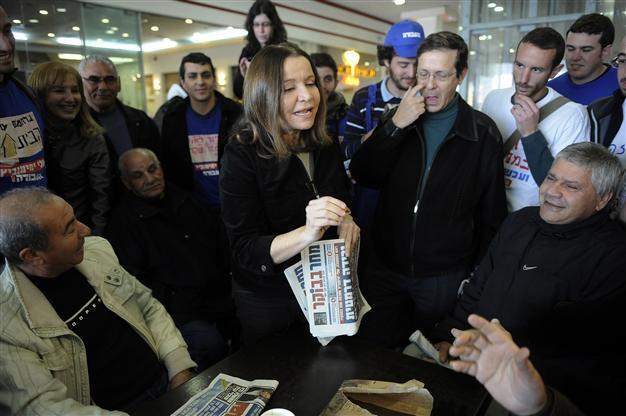One in 4 Israelis undecided as election looms: poll
JERUSALEM - Agence France-Presse

Israeli Labor party leader Shelly Yachimovich (C) debates with by-standers while campaigning, ahead of the January 22 general election, at a shopping mall in the southern city of Beer Sheva on January 10, 2013. AFP photo
With just 11 left before voting day, one in four Israelis are still unsure about who to back in the January 22 general elections for the country's 19th Knesset, a survey showed on Friday. According the results of a poll in the Maariv newspaper, only two thirds of respondents -- 67 percent -- knew how they were going to vote, while 25 percent said they were undecided. The rest either did not respond or said they were not intending to vote.
The poll, which was carried out by Maagar Mohot, questioned 506 people with a 4.5 percent margin of error.
Asked why they were undecided, 25 percent said there was no-one to vote for and 17 percent said voting would not change anything; seven percent said there was no difference between the parties and 23 percent said they were not interested in politics.
In a commentary on the poll, Maariv said it was unlikely that high percentage of undecided voters could have a decisive impact on the result.
"The answer is no. Most of the undecided voters fall within the leftwing parties, but only 60 percent of them intend to vote, so that we are not looking at an inter-bloc drama," it said.
Should they decide to vote, most would throw their weight behind the centrist Yesh Atid party, or Labour, the results showed.
"What is worrying is the number of citizens who do not intend to come to the polls. These are the indifferent people who say that they have no-one to vote for, that their vote is useless, or that the elections are of no interest to them," it said.
"This is a great educational failure that borders on a danger to democracy." Polls have consistently shown Israeli Prime Minister Benjamin Netanyahu winning the elections at the head of a joint list combining his rightwing Likud party and with the ultranationalist Yisrael Beitenu, which looks set to secure between 33 and 38 mandates in the 120-seat Knesset or parliament. The Maariv survey found the rightwing and religious parties would secure 71 seats, while the centrist and leftwing parties would take 39, and the Arab Israeli parties would get 10 mandates.
